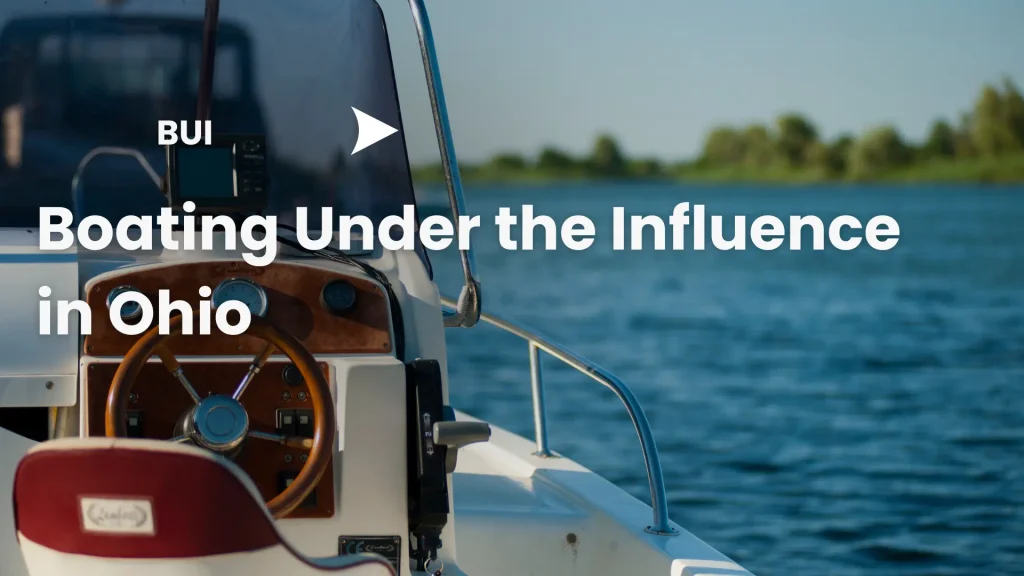Posted on Wednesday, August 20th, 2025 at 9:00 am

Ohio has no expansive coastline like California, but many residents enjoy boating on the state’s lakes and rivers. However, many people don’t realize they can face charges for operating a boat or other water vessel while impaired. Being caught boating while intoxicated in Ohio can lead to severe penalties, including jail time, hefty fines, and the loss of boating privileges, just like a first offense DUI on the road.
The Ohio drunk driving defense lawyers at [firm‑name] want you to know your rights in case you face an impaired boating charge. We have experienced OVI/DUI defense attorneys in Cincinnati and the surrounding areas, as well as dedicated OVI/DUI defense lawyers in Dayton who can help protect your rights and fight for the best possible outcome in your case. Otherwise, you might say or do something that hurts your case, leading to harsher penalties. We’re ready to take your case, and you’ll find a thorough guide to Ohio’s laws on intoxicated boating below.
What Is Boating Under the Influence in Ohio?
Ohio law defines boating under the influence as operating or being in “physical control” of a boat or other vessel if any of the following situations apply:
- The operator is “under the influence” of alcohol, a “drug of abuse,” or both. (“Under the influence” means the operator can’t operate the vessel safely.)
- The operator has a blood alcohol concentration (BAC) of 0.08 percent or higher.
- The amount of marijuana, cocaine, or other illegal drugs in the operator’s system exceeds specific thresholds. (The threshold depends on the drug in question.)
Essentially, this definition means there are two ways that law enforcement can charge someone with boating while intoxicated. The first is if the operator has any amount of drugs or alcohol in their system and can’t handle the boat safely. The second is if the operator has an illegal amount of alcohol or drugs in their system, this counts as boating while intoxicated & under the influence, even if the substances don’t appear to impact their physical abilities at the time.
As with drunk driving cases, the police have several methods to identify and arrest suspected drunk drivers. If they see a boat’s operators acting erratically, they can stop the vessel and administer a preliminary breath test or field sobriety tests. If the operator registers an illegal BAC, the police can take them into custody for a formal chemical test.
The police can also arrest someone without a preliminary breath test if they have other supporting evidence. For example, an officer might arrest someone who got too close to or ran into another vessel and appears intoxicated.
Ohio BUI Laws and Penalties
A first-time BUI in Ohio is a first-degree misdemeanor. The penalties for first-degree misdemeanors in Ohio include:
- Up to 180 days in jail
- A fine of up to $1,000
Ohio’s BUI law specifies that offenders typically must serve at least three days in jail. However, judges can sentence offenders to mandatory counseling instead of a jail sentence. A second conviction within 10 years carries a mandatory minimum of 10 days in jail. A third or subsequent conviction carries a mandatory minimum of 30 days in prison.
A BUI conviction can also have secondary consequences. For example, offenders might lose boating privileges or increase insurance premiums. A criminal record can also impede employment or housing opportunities for convicted offenders.
Defense Strategies for BUI Charges
The right defense strategy for an Ohio BUI charge depends on the evidence against you and other elements specific to your case. Some options your defense lawyer might explore include:
- Lack of probable cause for stop – Law enforcement must have a valid reason to stop your vessel. You can argue to have your charges dropped if the police didn’t have cause to stop you.
- Improper administration of sobriety tests – Field sobriety tests are more complex to perform on a boat due to wave movements. A skilled attorney can use this fact to challenge any conclusions from field sobriety tests.
- Unreliable breath test results – Breathalyzers sometimes produce faulty results on the water due to wind, temperature, or improper handling. Your lawyer can examine the circumstances of the breathalyzer test to challenge the evidence against you.
- Contamination of blood or urine samples – The police and lab techs must collect and store blood samples correctly. You can look for errors that may have led to unreliable or inadmissible results.
- No proof of intoxication while operating – You can’t be convicted if the state can’t prove you were the one operating the boat while under the influence. Eyewitness accounts and other evidence can show you weren’t in control of the vessel.
- Medical conditions or prescription drugs – Certain health issues or medications can cause slurred speech or unsteady movement unrelated to alcohol or drugs. Your lawyer can point out these facts to show why you may have appeared intoxicated but weren’t.
- Lack of Miranda warning – If officers question you after arrest without reading your rights, prosecutors cannot use your statements in court.
- Witness credibility issues – Your defense attorney can challenge conflicting or vague statements from officers or passengers to weaken the state’s case.
- Violation of testing procedures – Officers must follow strict rules for chemical testing. You can look for any testing mistakes and use them to suppress (dismiss) vital evidence.
- Video or audio recordings – Footage from marine patrol boats may show you behaving calmly, contradicting the officer’s claims of intoxication or impairment.
What To Do if the Police Arrest You on Suspicion of Intoxicated Boating

It’s vital to stay calm and polite if the police arrest you on suspicion of BUI. Don’t argue or resist, even if you think it’s unfair.
Next, ask to speak with a lawyer right away. Don’t answer any questions about drinking, drugs, or where you were going. Remember that the police can use anything you say against you later. Remain silent except to request legal counsel.
Please don’t agree to field sobriety tests, as they’re voluntary and can only hurt your case. However, refusing a chemical test carries severe penalties, including losing your vessel’s registration (if you’re the owner).
Most importantly, get legal help quickly to protect your rights and record. The sooner you speak to an attorney, the better your chances of avoiding the worst outcome in your case.
Moermond & Mulligan, LLC has the experienced team and knowledge to help you avoid the consequences of a conviction for boating while intoxicated in Ohio. Call (513) 421-9790 now or complete our contact form for a free consultation.
Related Post
Written By: Moermond & Mulligan, LLC
Last Updated: 12-17-2025